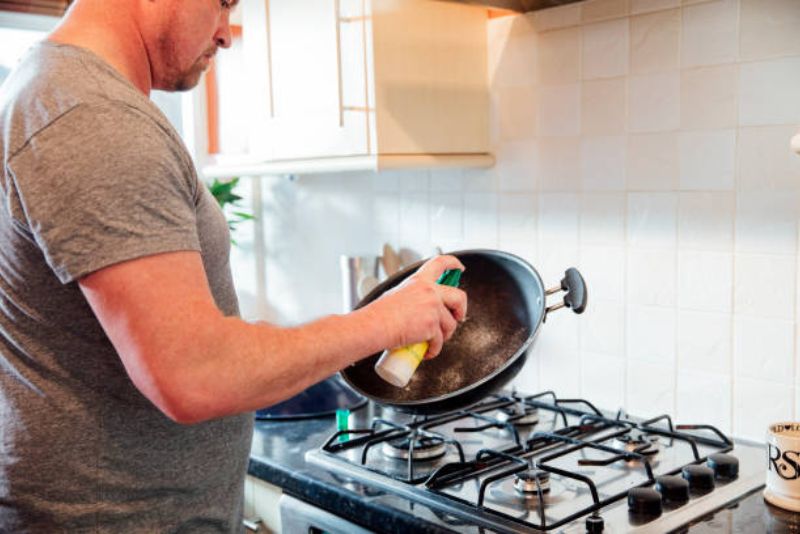Are you looking for a healthier, more natural alternative to cooking spray? Look no further! In this blog post, I’ll explore some of the best substitute options available that are just as effective as cooking spray while being much healthier and better for your body. Get ready to learn more about the amazing alternatives that can make meal preparation easier and less toxic!
Table of Contents
12 Substitute For Cooking Spray
The best substitute for cooking spray are butter and margarine. You can also use lard, olive oil, and avocado oil as agave nectar substitute.
Keep reading to learn how you can switch up your cooking routine without sacrificing taste or quality.
1. Butter
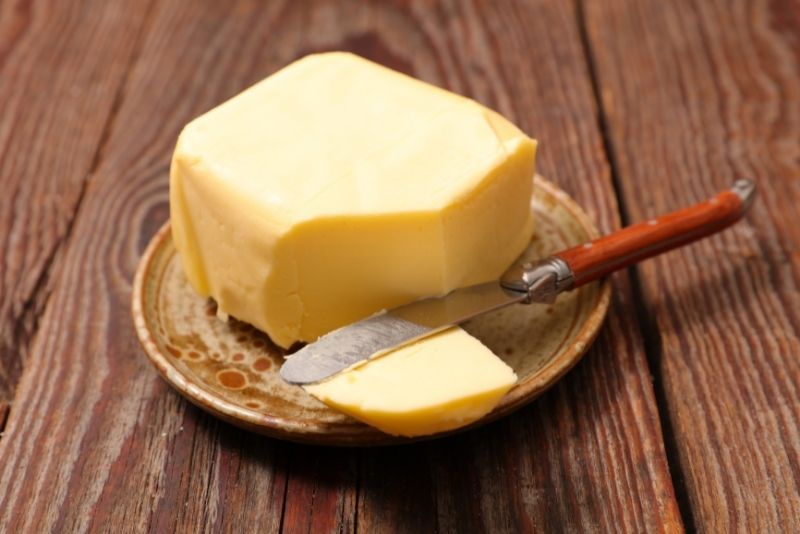
Butter is a versatile cooking oil that can be used in place of cooking spray. Its high smoke point means it works well for cooking at high temperatures, and its flavor makes food taste better. It can also be used as a moisturizer or to clean dishes.
You probably observed your mother using butter as a no-stick cooking method when you were a child. Wasn’t it great that the baking pans and cookware could be cleaned or rubbed with butter using the butter wrapper? It was economical, shrewd, and resourceful.
Butter emits a fragrant fresh scent when it is being cooked or fried, which can improve the flavor of your cuisine. Since it is solid at room temperature, controlling the portion size when frying or sautéing is simpler.
Cooking at a high temperature should only be done with caution because burnt butter will produce buildup that is challenging to remove. However, remember that butter doesn’t work as well in cold temperatures – use vegetable shortening instead if you need to use butter in these conditions.
2. Margarine
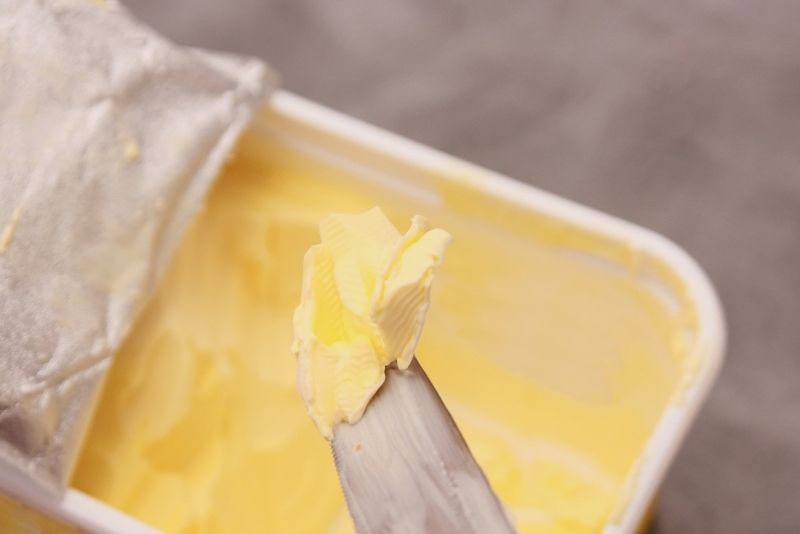
When cooking, it can be frustrating when food sticks to the pan. Margarine is a great substitute for cooking spray as it not only prevents food from sticking but also has a similar consistency and can be used in the same way.
Another option as a cooking spray replacement is margarine. In terms of taste, appearance, and functionality, it is essentially identical to butter, but without the dairy. Saturated fats are prevalent in both butter and margarine.
If you care about your health, either reduce how much you use or opt for healthier substitutes. Keep in mind that margarine doesn’t last as long as cooking spray, so use it sparingly. Store your margarine in the fridge or freezer to extend its shelf life even further!
3. Lard or shortening
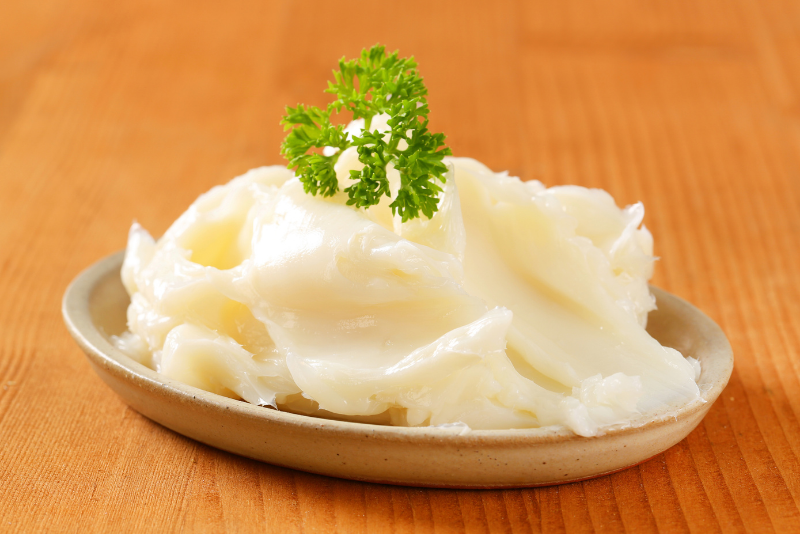
When it comes to cooking, substitute lard or shortening for cooking spray if you’re looking for a similar texture and flavor. These fats are also environmentally friendly as they can be used in place of harmful chemicals. Moreover, they have a higher smoke point than the cooking spray, meaning that they won’t react with food as quickly.
The fundamental distinction between lard and shortening is the amount of fat in each. While shortening primarily consists of plant fat, lard is formed of animal fat. In the US, shortening is also offered in All-Vegetable shortening or Butter Flavor under the brand name Crisco.
In terms of how they can replace cooking spray, lard and shortening are comparable except for their fat content and branding. At room temperature, both have a texture that is slightly firm but spreadable, making them simple to rub on your cookware. The edges of baking pans or rounded surfaces are easier to fold using this shape.
They are perfect for grilling, baking, and frying because they don’t change the flavor of your food (unless you get a flavored variety).
4. Bacon fat
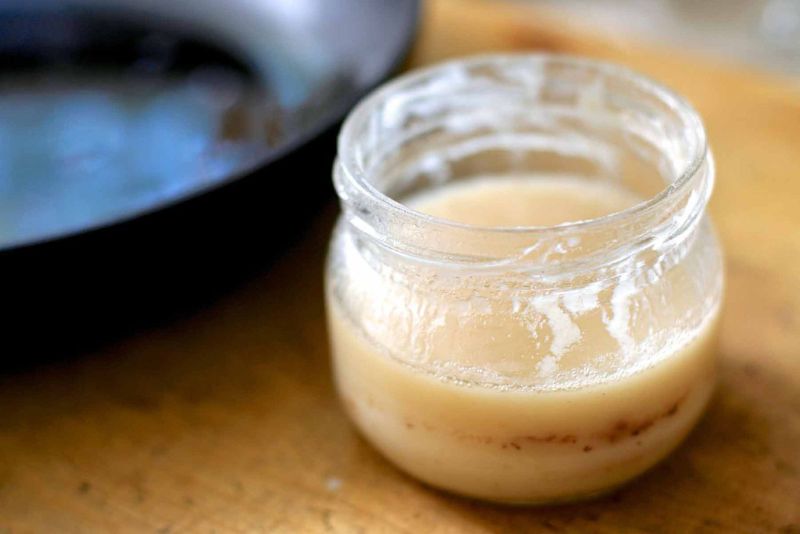
Bacon fat is a versatile cooking oil that can be used in many different recipes. It has a high smoke point, meaning it can be used to cook food items at high temperatures without causing them to catch on fire. The oily residue that remains after cooking bacon has several culinary applications.
This oil can be reused by wiping it (with a paper towel) on pans that you plan to use for additional frying. Keep in mind that this technique will give your food a faint bacon flavor, so pair it with foods like eggs, rice, other comparable meats, or veggies. Use it to cook or drizzle on salad dressings or veggies.
The bacon fat’s uses don’t end there, though! If you plan to frequently use this in place of cooking spray, drain the bacon bits and save the residual oil in a glass jar that you can keep in the refrigerator. It has the same almost-solid texture that makes it simpler to apply on cookware as homemade bacon-flavored lard kept in the fridge.
Additionally, its strong flavor makes it perfect for adding extra flavor to your dishes. You can also use bacon fat as a grease substitute when cooking with non-stick pans or spray bottles.
Furthermore, you can store it safely in an airtight container so that it doesn’t go bad over time. Plus, bacon fat is an excellent alternative to cooking spray – which often contains harmful chemicals
5. Flour
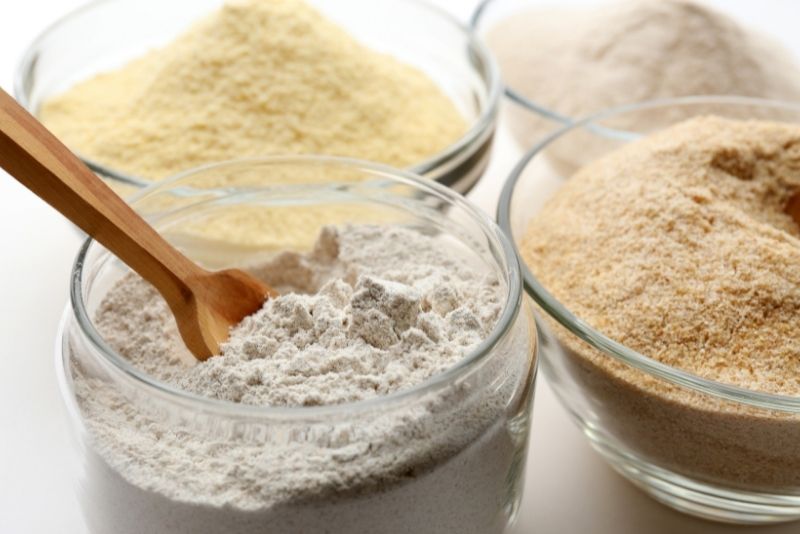
If you need to bake without sticking, flour works well. The simplest method to do this is to dust the interior of the pans. Only flour can effortlessly keep bread dough from becoming obstinately sticky.
Another approach is to softly rub a greasier material (such butter, shortening, olive oil, or lard) into the pans before sprinkling with flour if the flour does not adhere to the pans. For runnier batters that require a firmer no-stick layer, this technique will be helpful.
Because it does an excellent job of maintaining your batter’s integrity and doesn’t change the flavor of your recipe, flour makes an excellent cooking spray substitute for baked products.
Flour is a great substitute for cooking spray. It absorbs moisture and helps to create a crispy crust on your food. It’s best used with delicate foods like fish or vegetables, as it can also make them taste bitter if used excessively. Keep in mind that flour can cause your food to taste bitter so use it sparingly if you want to try this out!
6. Tallow
Tallow is a great substitute for cooking spray because of its high smoke point. It can be used to fry food or bake as it has a nutty and smoky flavor that can replace vegetable oil or butter.
Because both tallow and lard are made from animal fat and have a solid, malleable consistency at room temperature, they are remarkably similar to one another. The key distinction is that while tallow is made from rendered cow fat, lard is made from pig fat.
Now that we’ve made the distinction, it’s simple to comprehend why tallow might serve as an alternative to cooking spray. Tallow is a well-known and versatile cooking oil. Because it can be used at extremely high temperatures, frying is its best skill, providing you extra crispy chicken or seared steak.
Additionally, it can be used for sautéing and baking. Tallow should be stored properly as the higher the smoke point, the less stable it is fatty acids so make sure to store it away from heat and light!
7. Extra Virgin Olive Oil (or just olive oil)

Cooking spray can be replaced with extra virgin olive oil if you’re seeking for a healthier fat option. It’s still a no-stick alternative that may give your dishes—like meat, seafood, pasta, eggs, and vegetables—that distinctive flavor. A few drops of olive oil on the pan should work if all you want is the non-stick feature.
Even while extra virgin olive oil is popular among health-conscious people, keep in mind that it also has a low smoke point. Foods that require a lot of heat, such as fried chicken or bacon, won’t turn out crispy enough when cooked in olive oil.
Extra virgin olive oil is a versatile cooking oil that can be used in many ways – from making food delicious to prevent foods from sticking to the pan.
Not only is it healthier than the cooking spray, but its flavor is also subtle and can easily substitute for cooking spray in most recipes. Its health benefits are vast too – olive oil can help reduce heart disease, cancer, and Alzheimer’s.
So if you’re looking for a healthy cooking option that packs a punch, extra virgin olive oil should definitely be at the top of your list!
8. Canola oil
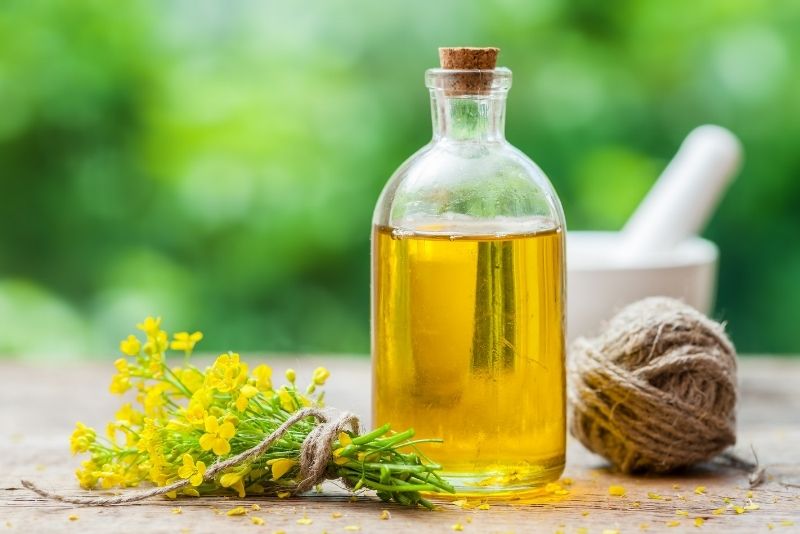
For people who are concerned about the oil’s fat content, canola oil is an additional preferred choice. Cooking spray can be replaced with canola oil, which is more affordable than olive oil and has more “good fats” than olive oil.
Another benefit of using canola oil is that it won’t change the taste of your dish. Canola oil would be a likely choice if you were planning to cook food on medium to high heat, however other types of oil may sustain higher temperatures as well. Canola oil is suitable for baking pan lining, frying, and sautéing.
Canola oil is a great substitute for cooking spray as it’s a mild oil that doesn’t contain harmful chemicals. Additionally, its smoke point makes it the perfect oil to cook with on those dreaded days when you just can’t bring yourself to use vegetable oil.
Another plus of using canola oil is that it has low calories and therefore helps keep your diet healthy. Moreover, because of its unsaturated fat content, canola oil protects your heart health by reducing bad cholesterol levels in the bloodstream.
9. Vegetable oil
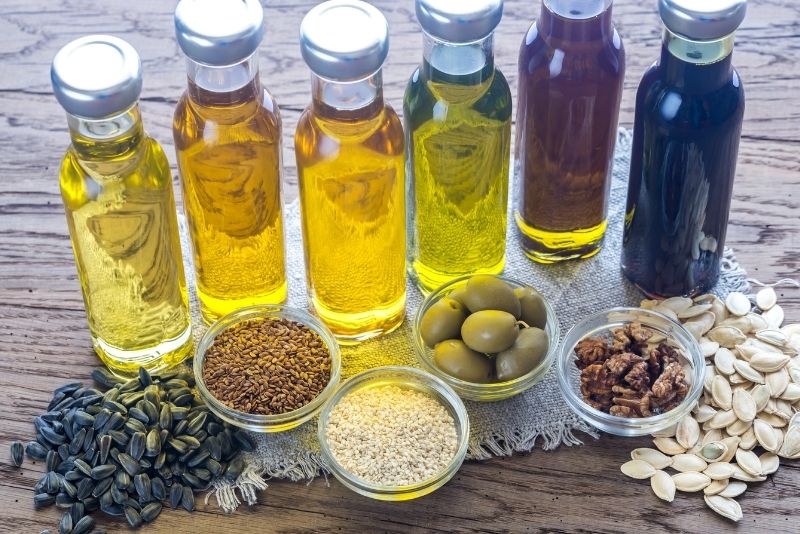
Vegetable oil is an additional oil worth mentioning. If you run out of cooking spray, you should keep vegetable oil on hand since it is a typical kitchen oil. Vegetable oil is a fantastic cooking or baking oil that can endure extremely high temperatures because it has no flavor (plain).
As vegetable oil is a healthy option that doesn’t add any extra fat to your diet, it can be used in place of cooking spray. It also helps prevent sticking and makes utensils less greasy, which can result in reduced grease build-up on dishes.
Keeping food from sticking to utensils is especially helpful if you have arthritis or other forms of joint pain as it reduces the amount of friction involved.
10. Avocado Oil
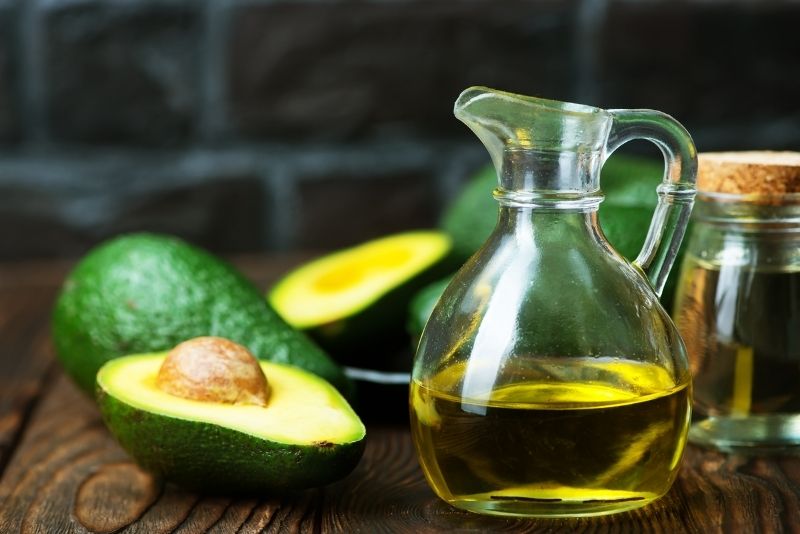
Expensive, but worth it for the creamy, great flavor and health advantages. Additionally, it can endure higher temperatures.
Avocado oil is a great substitute for cooking spray because of its high smoke point. It can also be used as a salad dressing, dip, or moisturizer.
Avocado oil is high in monounsaturated fats and can help reduce the risk of heart disease. Make sure to store avocado oil in an airtight container to prevent it from going bad.
11. Fat-free dairy products
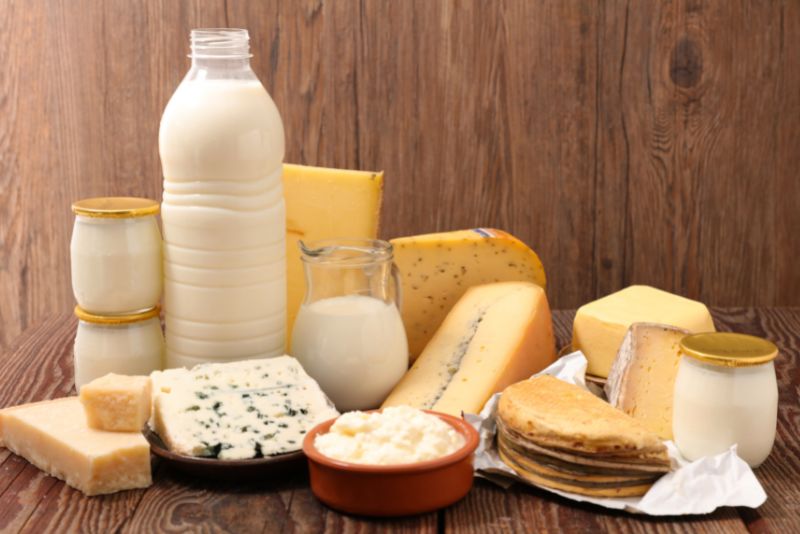
To replace your need for cooking spray, choose a dairy product that is fat-free if you are watching your diet.
While it may be tiresome to combine 3 parts water with 1 part fat-free dairy product, you can save this mixture for later use and get the same advantage as a cooking spray.
This alternative is ideal for you if avoiding trans fats is your main priority.
Fat-free dairy products can be a great substitute for cooking spray. Not only are they non-stick, but they also contain properties that make food less prone to sticking and more appetizing to eat. Adding them to sauces, gravies, and salad dressings can give your dishes an extra zing!
12. Parchment paper
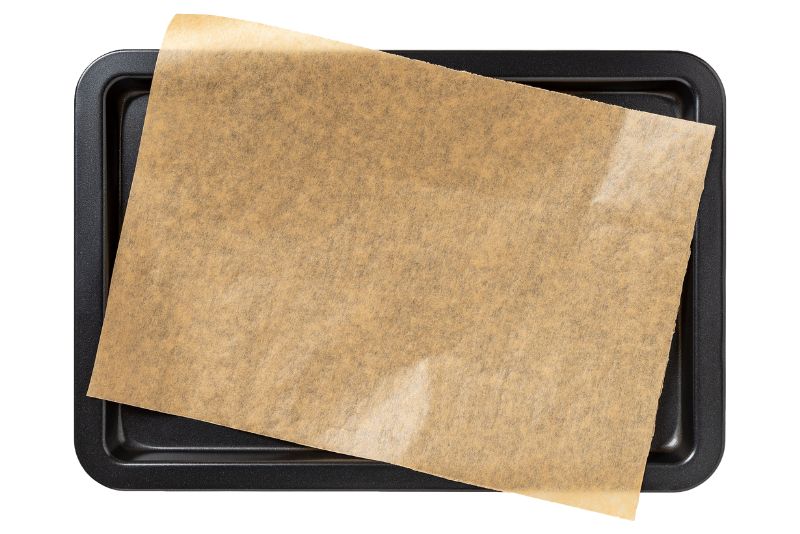
Cooking spray can be substituted with inexpensive and effective parchment paper during baking.
Another tried-and-true technique for making sure that your meals and cakes don’t stick to the pan is parchment paper, which has a wax coating. It’s conveniently mess-free because cleanup won’t be a challenge.
Since you won’t be adding butter or oil to your food, it’s also healthier. For this kitchen savior, the person who created parchment paper deserves a huge cake.
Parchment paper is a great alternative to the cooking spray. Additionally, parchment paper can be used in many ways that cooking spray can’t – such as baking or frying. So experiment and find out what works best for you!
What does cooking spray taste like?
Cooking spray is a common tool in many homes. The non-stick cooking spray has a relatively faint flavor, though some individuals could perceive a chemical flavor.
Frequently Asked Questions
1. What can you use in place of cooking spray?
Use your preferred healthy high-temperature cooking oil in its place since cooking spray is essentially pressurized, watered-down oil.
Pure olive oil is advised, but you can also use an oil with a neutral flavor, such as safflower oil or avocado oil.
2. What can I use instead of nonstick spray?
You can use shortening, butter, vegetable oil, and bacon fat as substitute of nonstick spray.
3. Can I use cooking spray instead of vegetable oil?
The calories can be reduced by substituting cooking spray for butter and oil.
Switching to a spray can result in less calories (and grams of fat) in your cooking since butter and oil have 100 to 120 calories per tablespoon (respectively).
4. Can you use water instead of cooking spray?
Yes, you can substitute cooking spray with water when cooking your food. Although water doesn’t work as well as cooking spray in high temperatures, it is still an effective substitute. Learning to stir-fry or saute without oil is as easy as it seems, and sure, water is all you need.
